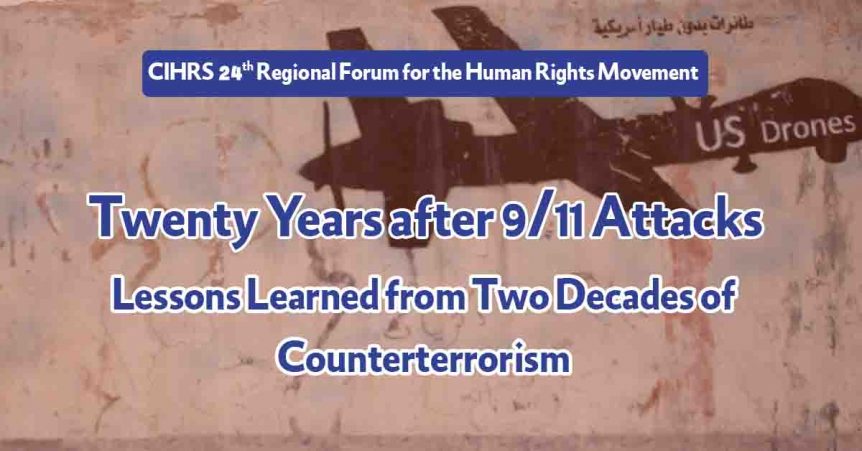CIHRS 24th Regional Forum of the Human Rights Movement
The Cairo Institute for Human Rights Studies (CIHRS) convened the 24th Forum of the Human Rights Movement in the Arab region on September 7 and 8, with the aim of discussing lessons learned from two decades of counter-terrorism, and outlining how terrorism could have been addressed more effectively.
Twenty years after the ‘Global War on Terrorism’ commenced in the aftermath of the 9/11 attacks, the threat of terrorism has evolved and proliferated across the globe. This outcome took place despite the prioritization of counter-terrorism on the international agenda and the over-reliance of most states on securitized and heavy-handed counter-terrorism legislations and measures, which have been severely detrimental to human rights.
The Forum brought together dozens of human rights defenders, civil society activists, and academic experts from the Arab Region, the United States, and Europe.
The first session of the Forum addressed international dimensions of counter-terrorism through discussing the evolution of the international political and legal architecture that developed in the aftermath of 9/11, particularly that which concerns the United Nations. The session also gave an overview of how the ‘War on Terrorism’ affected human rights and its defenders within the Arab region.
The second session of the Forum focused on the intersection between terrorism and authoritarian governments in the Arab region. Through the discussion on the case of Syria, the session shed light on how some authoritarian rulers utilize counter-terrorism as a survival strategy and present themselves to their populations and the international community as a bulwark against extremism while cracking down on peaceful dissent. In addressing the case of Iraq, the session additionally highlighted some of the drivers of radicalization in the Arab region, including authoritarian and sectarian policies, governance and institutional shortcomings, and failure to resolve armed conflicts.
The following are the main conclusions of the Forum:
- Since the 9/11 attacks, counter-terrorism efforts were conceived by the international community through a paradigm of ‘war’ rather than being addressed from a criminal justice perspective.
- The war paradigm led to the intensifying of national and international conflicts; the proliferation and normalization of exceptional counter-terrorism legislations and policies that eroded political rights and civil liberties; and the marginalization of civil society on the international and national levels.
- Such approach resulted in mainstreaming over-securitized measures against terrorism, which had a devastating impact on human rights universally, and failed to adequately recognize how attacks on human rights and the lack of social, economic, and political justice fuel radicalization.
- Authoritarian rulers in many Arab states capitalized on this approach, and utilized counter-terrorism as a tool to consolidate their power, eliminate competition, and crackdown on political dissent and human rights defenders.
- In the aftermath of the Arab Spring, authoritarian rulers in the region sought to secure their rule through political violence and repression, engaging in internal and external armed conflicts, adopting sectarian policies, or cooperating with terrorist groups. These practices were essential to the proliferation of terrorism throughout the past decade.
- Terrorism cannot be isolated from the legacy of violence practiced by authoritarian leaders in the Arab region since the mid-20th century.
- Some authoritarian rulers manipulate the threat of terrorism to present themselves to their populations and the international community as the only acceptable alternative, while perpetuating policies conducive to terrorism and radicalization.
- The last decade proved the past victories over terrorist groups were often ephemeral. As long as structural conditions that produce terrorism remain unaddressed, its threat will manifest itself recurrently.
- Confronting terrorism requires a fundamental change to existing approaches. The creation of strong and resilient institutions, as well as strong democratic movements, is an essential step to building national democratic states that are able to offer effective governance and access to justice to their citizens, and therefore are able to prevent the threat of terrorism from taking shape.
CIHRS 24th Regional Forum of the Human Rights Movement opening statement here
CIHRS 24th Regional Forum of the Human Rights Movement publications:
Share this Post

